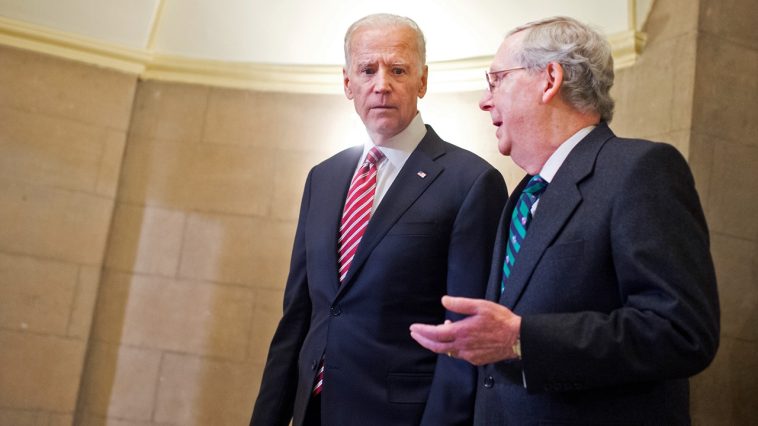LISTEN HERE:
Despite the recent passage of a substantial debt-limit and spending-cuts plan by House Republicans, it seems neither Democrats nor Republicans have shifted their stance on the debt ceiling as of Sunday. Democratic Senator Chris Coons compared the situation to a hostage crisis during his appearance on ABC’s ‘This Week.’ Coons criticized the Republican approach, stating, ‘The Republicans are demanding hostage negotiations where they will crash the full faith and credit of the United States.’ He argued that this would push our nation into recession and weaken our global standing.
House Democratic Whip Katherine Clark urged the GOP to put country first and to act as ‘grown-ups in the room’ when it comes to addressing the debt ceiling. ‘The American people are looking at us,’ the Massachusetts Democrat said on MSNBC’s ‘Inside with Jen Psaki,’ and they recognize that ‘this shouldn’t be a partisan drama playing out that we are going to foot the bill for.’ Clark stressed the need to avoid a default crisis manufactured by the Republican party, and then focus on investing in the nation’s future.
On the other side of the aisle, Republicans continue to hold President Joe Biden accountable for the debt ceiling issue. Despite the President’s call for Congress to approve a clean debt limit increase, he has stated that he will not negotiate with Republican House Speaker Kevin McCarthy regarding the matter. He cites historical precedent for establishing the debt limit as non-negotiable. ‘Happy to meet with McCarthy,’ Biden declared during a brief White House press conference on Wednesday, ‘but not on whether or not the debt limit gets extended. That’s not negotiable.’
In response, House Majority Leader Steve Scalise called for President Biden to put his differences aside and engage in a constructive dialogue. Speaking on ABC’s ‘This Week,’ Scalise told host Martha Raddatz, ‘The White House ultimately needs to get into this negotiation. The president has been in hiding for two months, Martha.’ He argued that this lack of leadership is unacceptable to the American people, who expect the president to sit down with Speaker McCarthy and initiate negotiations.
Scalise went on to claim that President Biden is trying to create a debt crisis by ‘running out the clock.’ He maintained that the Republican-led House had done its part by passing a bill to address the problem, and it was time for the president to ‘get in this game, get off the sidelines and let’s start negotiating and figuring this out. Not in June when we get to the midnight hour, but today.’
Democratic Senator Chris Van Hollen from Maryland stepped in to clarify the administration’s position on the matter. He confirmed that President Biden is open to discussing terms with McCarthy but refuses to negotiate the debt limit itself. ‘What he said,’ Van Hollen explained on ‘Fox News Sunday,’ ‘is that he’s not going to negotiate with people who are threatening to literally blow up our economy, right, put more people out of work, drive up costs, in order to get their way.’
Van Hollen continued, stating that President Biden is prepared to sit down with Speaker McCarthy in the context of budget and appropriations discussions. He emphasized the importance of negotiating within a framework that does not risk putting more Americans out of work or causing a significant increase in costs. The administration remains committed to responsible financial policy and protecting America’s economic well-being.
The consequences of a failure to raise the debt ceiling could be disastrous for the United States. Financial analysts have warned that the country may default on its debt in the coming months if Congress does not take action. This default could trigger a severe economic crisis, as well as undermine our nation’s credibility on the global stage.
Democratic Representative Ro Khanna of California also weighed in on the subject during his appearance on CBS’ ‘Face the Nation.’ He expressed confidence in President Biden’s awareness of the potential danger of default, asserting that the president knows ‘we can’t default.’ Khanna suggested a possible avenue for negotiations that could involve the president and Senate Minority Leader Mitch McConnell.
Khanna elaborated on this proposal, reiterating the administration’s stance that discussions should not center around paying the nation’s bills. He said, ‘He’s [President Biden] saying we can discuss that, we can negotiate but first pay your bills.’ According to Khanna, Senator McConnell understands this stance, and there is potential for a productive meeting between him and the president.
In summary, the two parties remain at odds over the debt ceiling, with Democrats urging Republicans to take a more responsible approach and to agree on raising the limit. Republicans, on the other hand, criticize President Biden for his unwillingness to negotiate on the matter.
Without a consensus, the threat of a default crisis looms large, with potentially devastating consequences for the US economy and our global credibility. This high-stakes game of chicken between the two parties seems to place national well-being below partisan tactics.
What remains to be seen is whether or not a breakthrough can be achieved in the near future, with both sides working together to find a compromise that will avert a crisis. In the meantime, Americans can only hope that their elected officials remember their duty to the public and the nation as a whole.
While the situation remains tense, the possibility of negotiations between President Biden and Senate Minority Leader Mitch McConnell offers a glimmer of hope for a resolution to this contentious issue. If pursued in earnest, it might succeed in bridging the current partisan divide and finding a mutually agreeable solution.
Considering the stakes involved, it is crucial for both parties to put their political differences aside and unite in their efforts to protect America’s financial stability and future. In the end, only a spirit of cooperation and pragmatism can help ensure the continued prosperity and security of our great nation.


